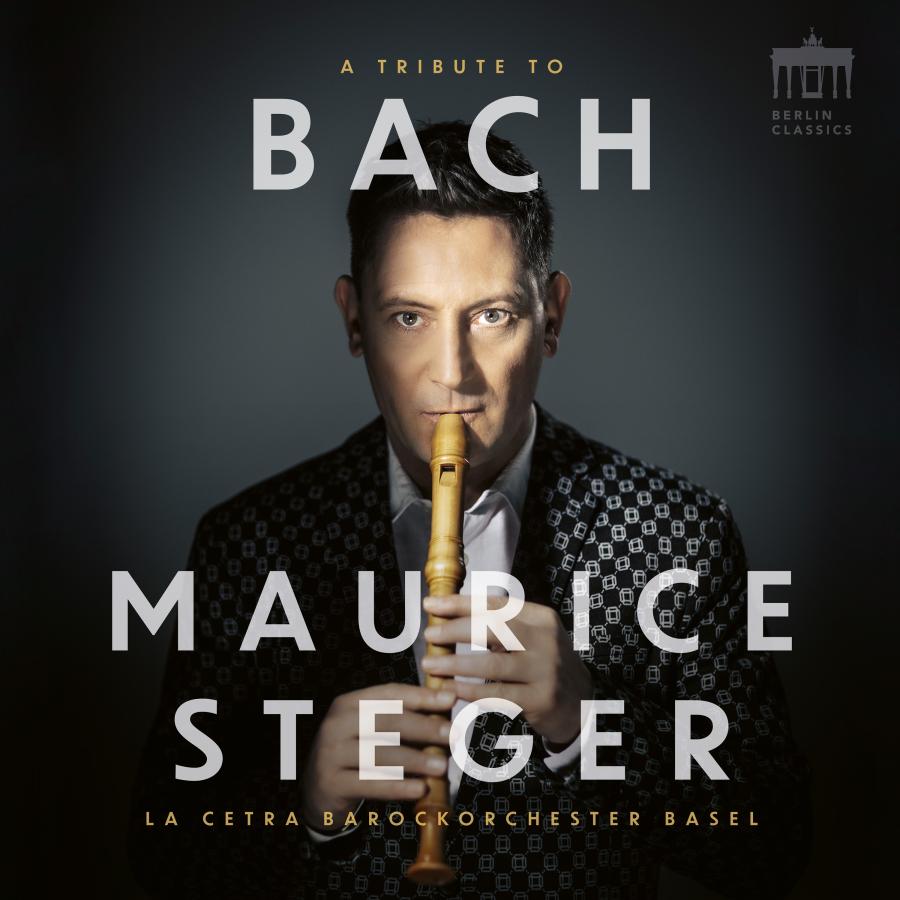
Maurice Steger and La Cetra with Music of Bach
Berlin Classics,
8.9.2023
Stream: Apple Music Spotify
Maurice Steger Recorder & Direction
La Cetra Barockorchester Basel
A Tribute to Bach
This album carries the intention already in its title: “A Tribute to Bach” is meant to be a deep bow of the world-famous recorder player Maurice Steger to the great master of the music world, Johann Sebastian Bach.
For his Bach project, Maurice Steger has selected six compositions that follow six different musical genres, placing the recorder at the forefront of solo instrumentation. In doing so, he places himself in the tradition of Bach himself, who demonstrably repeatedly made new instrumentations for his works in the course of his life. The sonic result is fascinating: Bach becomes a convincing recorder player through Maurice Steger’s interpretation.
First up is the Concerto in D major for recorder, strings & b.c., BWV 1053 R. He is accompanied here by the multiple award-winning La Cetra Barockorchester Basel, with whom he already collaborated on his last album. The orchestra fulfills all wishes that could be placed on a baroque orchestra and consists exclusively of specialists for early music. In the following excerpt from the cycle “Das musicalische Opfer” (BWV 1079), the Sonata in G minor (BWV 1020), the Trio Sonata in D minor (BWV 527), as well as the Sonata in E major (BWV 1035), soloists from the La Cetra Baroque Orchestra play. Among others, violinist Katharina Heutjer, harpsichordist Sebastian Wienand, cellist Jonathan Peśek and recorder player and bassoonist Claudius Kamp should be mentioned here.
At the end, the full richness of the fantastic orchestra is heard again in the Concerto in F major for harpsichord, two recorders, strings & b.c., (BWV 1057). These works span several important stages of Johann Sebastian Bach’s life and were written in the span between 1721 and 1747. Some of them were written while the composer was still in Köthen; one of the works, the Sonata in E major, was demonstrably composed on a trip to Berlin. Later, in Leipzig, Bach reworked or completed many of his works. In the case of the G minor sonata, the authorship could also lie with his son C.P.E. Bach, experts are not quite sure about this. Bach created the works for special occasions and clients, or for friends and highly talented musicians of his time.
It is indeed known that Bach himself also played the recorder, especially in his youth. Even then, the recorder was the “beginner’s instrument” with which one could easily learn basic music skills such as note reading, rhythm and intonation. It is true that Bach used the recorder with great finesse in many of his works, but unfortunately there are no records of his pure recorder works. We therefore cannot say with certainty how his music would sound for recorder, but as we know his music leaves much room for interpretation and experimentation. Bach’s notations are often very detailed and contain specific instructions, but his music is so profound and complex that there are different ways to interpret and express it.
The music on this album shifts from insane instrumental virtuosity to very gentle expressions that only a true master of the recorder can gallantly sound. A recorder player like Maurice Steger cannot bow to Johann Sebastian Bach more beautifully and gracefully.
More information can be found here.

Press commentary
A true feast
Maurice Steger is one of the greatest recorder players. Most recently, the Swiss-born in 1971 presented a grandiose album, including works by Handel. Now Bach is on the program. Steger arranged it for his instrument, following the example of Bach, who himself liked to re-instrument. The virtuosity on the flute is breathtaking, the sound velvety-soft. Accompanied by the exquisite La Cetra Baroque Orchestra from Basel – a true feast.
Falter, 22.8.23
Light and buoyant
Finally, the transparent rendition of the Concerto in F major for harpsichord, two recorders, strings and basso continuo BWV 1057 is convincing. Sebastian Wienand (harpsichord), Maurice Steger and Claudius Kamp (recorders) as well as the La Cetra Barockorchester Basel play together in such a light and buoyant manner that the multiple motivic structure of the themes only bubbles forth.
OnlineMerker, 24.8.23, Alexander Walther
Successful
In personal union as soloist and conductor, recorder player Maurice Steger bows to grand master Johann Sebastian Bach.
Those who pay tribute to Bach would not necessarily immediately think of the recorder as a solo instrument. But what the highly virtuoso Maurice Steger, who recently also appeared as a conductor, and the Basel Baroque Orchestra La Cetra unfold here in terms of joy of playing, creative artistry and richness of expression is truly a successful “Tribute to Bach”! … The gripping and rousing performance here inevitably casts a spell over every listener. And apart from the fact that re-instrumentation and arrangements were common in the Baroque period anyway, such fulfilled music-making justifies itself.
by Sabine Näher, 13. September 2023, Concerti.ch
CD of the week
Maurice Steger plays the many instruments of the recorder family in a highly virtuosic, lively and stirring manner – and thrills his fans with it. With his latest album, he pays homage to the great baroque master Johann Sebastian Bach.
Ulrike Henningsen, NDR Kultur from 24.9.23 (ndr.de)
Maurice Steger shows himself here as a kind of “Glenn Gould of the recorder” and plays the solo part with crazy virtuosity… Moreover, Maurice Steger and his fabulous Basel Orchestra are truly first-class performers.
Radio Bremen 2
Multifaceted and richly coloured
Maurice Steger is both soloist and partner of the La Cetra Baroque Orchestra, whose members in turn take on solo passages such as Sebastian Wienand or Claudius Kamp. The result is a multifaceted, richly coloured picture of Bach, with the recorder at the centre, confidently stepping out of the shadow of Bach’s main instruments, the violin and harpsichord.
BR Klassik Tafel-Confect, 24.09.2023 by Wolfgang Schicker




